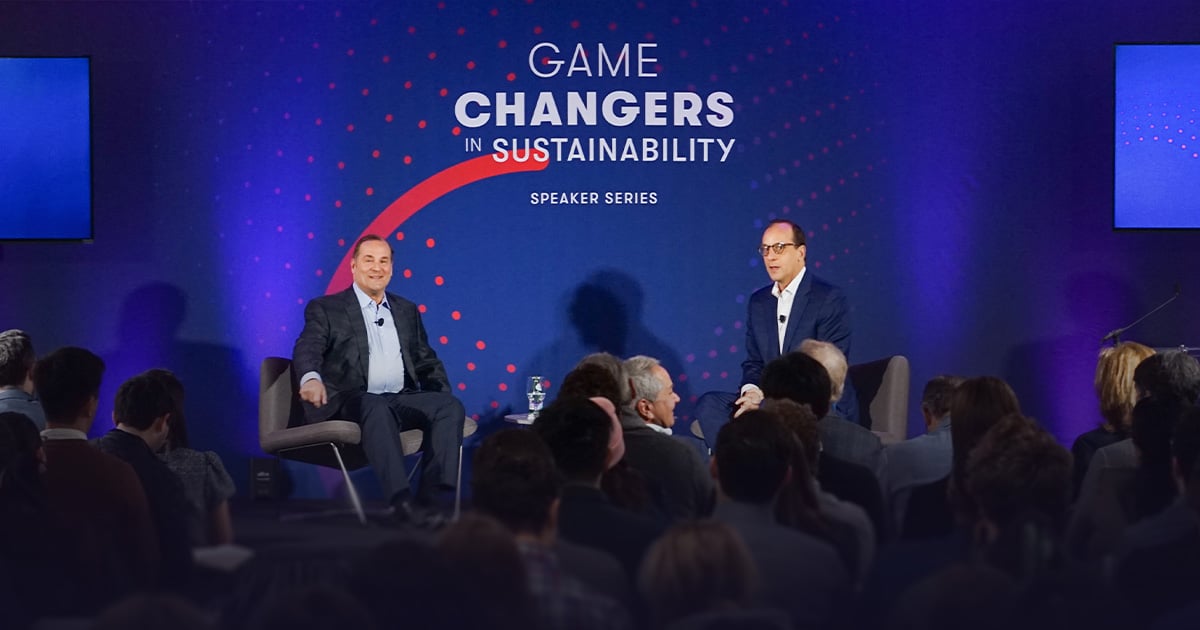
Kogod School of Business
Even those who travel just a handful of nights each year have likely stayed at a Marriott International-affiliated hotel. Headquartered in Bethesda, Maryland, the company’s portfolio spans 138 countries and dozens of brands ranging from budget hotels in small towns to ultra-luxury resorts and properties in some of the world’s most coveted destinations.
What you may not have realized during your most recent stay, though, is all that’s going on behind the scenes to make the world’s largest hospitality company one worthy of accolades on multiple sustainability fronts.
This ongoing effort was the centerpiece of Marriott president and CEO Anthony Capuano’s visit to campus on March 3 for the second edition of the Kogod School of Business’ one-of-a-kind speaker series, Gamechangers in Sustainability. In partnership with AU’s Sine Institute of Policy and Politics, the series examines how the most innovative leaders work to create a more sustainable world.
Introducing Capuano, AU Board of Trustees Chair Marc Duber likened Marriott’s principles to the university’s seven-year strategic plan title.
“Changemakers for a changing world,” Duber said. “We share this with the Marriott core philosophy.”
Kogod Dean David Marchick, moderating the discussion, noted the irony of featuring a guest from a company headquartered mere minutes from campus, given the university’s global search for perspective and expertise as part of this series, to complement its bolstered investment in sustainability.
“We scoured the universe to say, ‘Who are the most innovative companies in these spaces?’ And Marriott is one of them,” Marchick said.
Despite its vast—perhaps even daunting—reach, Marriott has attained such a reputation, with 1.5 million hotel rooms in its portfolio and an additional half million in the pipeline. Add in changing consumer habits emerging from the pandemic and the fact that Marriott itself owns just a tiny portion of its hotels, and achieving tangible goals in sustainability is far from an easy feat.
But increasingly, Capuano told the audience, true sustainability progress has been a priority for each of the company’s four key constituencies: investors, staff, guests, and individual property owners.
“Every one of these groups is demanding, not flowery talk, not a well-written page in the annual report,” Capuano said. “They are demanding we set stretch goals and report on our progress against those goals.”
It’s a landscape with which Kogod students are becoming increasingly familiar, too, Marchick pointed out, through coursework like Kogod Professor Ajay Adhikari's spring 2023 course, Sustainability Reporting and Analysis.
For its part, Marriott can report real progress: It’s kept some half-billion mini-bottles of shampoo, soap, and conditioner out of landfills, Capuano said, thanks to the company’s shift to larger, family-style shower product bottles—a shift that came with little customer objection.
The company has also begun to wade more deeply into the implications of food waste, a key carbon contributor and the subject of more than a decade’s worth of research, partnerships, and on-campus policy changes at AU.
Today, you might find Marriott chefs making gazpacho out of unused fruits or vegetables left behind at the breakfast buffet or constructing stocks and soups using perfectly adequate but “ugly” vegetables, often unsold by producers and supermarkets alike purely because of aesthetics.
I’m very much a believer that all of us are short-term tenants on this beautiful planet, and we have a responsibility to care for this beautiful planet.”
-Mar-10-2023-05-53-50-5871-PM.png)
Anthony Capuano
President and CEO, Marriott International
More holistically, this philosophy has led the company to grapple with some of its properties’ darkest misuses. After training a million of its own associates about human trafficking warning signs with its first-in-the-industry online program, Marriott partnered to share the tool with competitor hotel chains, facilitating training for some 800,000 Hilton, Four Seasons, and InterContinental Hotels Group employees.
Meanwhile, Marriott’s global transaction team has gone from entirely male to nearly a third female—a metric, Capuano was quick to point out, still falls well short of optimal but demonstrates the company’s hunger for continued progress.
You can’t wake up one morning and decide to be a diverse, inclusive, equitable enterprise. It takes years, if not decades, of constant commitment, and the minute you are self-satisfied, you go into a death spiral.”
-Mar-10-2023-05-53-50-5871-PM.png)
Anthony Capuano
President and CEO, Marriott International
Concluding the discussion, Marchick confirmed that what he heard from Marriott’s chief only validated the decision to invite him to campus.
“What we’ve seen today is a leader who not only runs the largest hospitality company in the world but someone who is also a changemaker,” Marchick said.
The spring semester’s third Gamechangers in Sustainability event is set for April 21. In celebration of Earth Day, this Founders’ Forum will feature three women entrepreneurs behind three sustainable businesses: Monica Pearce of Tenth Ward Distilling, Nicole McGrew of Threadleaf, and Sara Polon of Soupergirl. Audience members can pre-register to attend the event in-person or virtually from 1 to 2 p.m. ET.
